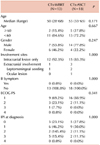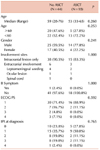See the letter "Relapse pattern and prognosis of primary CNS lymphoma" on page 154.
THE AUTHORS' REPLY: We thank Dr. Dahiya and his co-investigator for their interest in our paper. We totally agree with Dr. Dahiya on the importance of patient characteristics for evaluating the outcome of chemotherapy followed by autologous stem cell transplantation (CTx-ASCT) for primary CNS lymphoma (PCNSL).
We compared the baseline characteristics of all patients, except 3 patients who received best supportive care only (Table 1). Age, Eastern Cooperative Oncology Group (ECOG) performance status (PS), and international prognostic index (IPI) of patients who received CTx-ASCT were not significantly different from those of patients who received other treatments. Complete response (CR) or partial response (PR) was shown by 100%, 62.1%, and 84.6% of the patients treated with CTx-ASCT, CTx only, and CTx followed by whole brain radiotherapy (CTx-WBRT), respectively [1]. The selection bias due to exclusion of patients who were refractory to chemotherapy might have contributed to the better outcome of CTx-ASCT. Nonetheless, 5 of the 18 patients who showed PR after CTx achieved CR after ASCT, suggesting that ASCT might have improved the clinical outcomes in these patients.
Characteristics (Age, ECOG PS, and IPI) of patients who received CTx-WBRT and CTx-ASCT were not significantly different (Table 2), but compared to CTx-WBRT, CTx-ASCT had better response, as shown in our previous report [1]. We did not assess the risk of neurotoxicity due to lack of data, but the risk of acute and late neurotoxicity after WBRT is well described by previous studies [2-4]. A previous study showed that CTx-WBRT affords the benefit of improved progression-free survival, but the increased risk of neurotoxicity limits this benefit [5]. Our study has limitations of retrospective design, such as patient selection bias and lack of data on treatment-related toxicity including neurotoxicity; therefore, the benefits of ASCT after CTx should be verified by a prospective analysis. However, such a prospective trial would be difficult to conduct, considering the rarity of PCNSL, different treatment strategies in different institutions, and treatment-related toxicities.
In conclusion, CTx-ASCT improves outcomes in PCNSL patients and results in better response rate and failure free survival, as shown by multivariate analysis conducted for a single center cohort of patients treated with relatively consistent treatment strategies. Further, the baseline characteristics of patients who received different treatments were similar.
Figures and Tables
Table 2
Comparison of characteristics of patients who received subsequent treatment after chemotherapy (N=31).

Abbreviations: ECOG PS, Eastern Cooperative Oncology Group performance status; IPI, international prognostic index; WBRT, whole brain radiotherapy; ASCT, autologous stem cell transplantation; CTx-WBRT, chemotherapy followed by whole brain radiotherapy; CTx-ASCT, chemotherapy followed by autologous stem cell transplantation.
References
1. Kim JE, Yoon DH, Kim S, et al. Relapse pattern and prognostic factors for patients with primary central nervous system lymphoma. Korean J Hematol. 2012. 47:60–66.

2. DeAngelis LM, Seiferheld W, Schold SC, Fisher B, Schultz CJ. Combination chemotherapy and radiotherapy for primary central nervous system lymphoma: Radiation Therapy Oncology Group Study 93-10. J Clin Oncol. 2002. 20:4643–4648.

3. Ferreri AJ, Crocchiolo R, Assanelli A, Govi S, Reni M. High-dose chemotherapy supported by autologous stem cell transplantation in patients with primary central nervous system lymphoma: facts and opinions. Leuk Lymphoma. 2008. 49:2042–2047.





 PDF
PDF ePub
ePub Citation
Citation Print
Print



 XML Download
XML Download